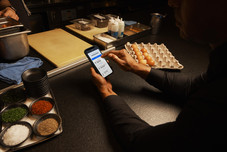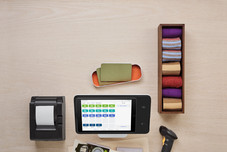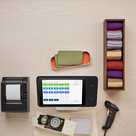Table of contents
Consumer preferences and behavior have shifted dramatically over the past few years.
You can get almost anything you want from Amazon delivered to you in a day. You can get a ride from Uber in minutes, or the best burger in town from a meal delivery service in 30. You can have a stylist from Stitch Fix curate your entire wardrobe while Netflix curates your Friday night.
As a result, people now expect fast, convenient, and personalized purchasing experiences at every turn.
This year, consumers will expect no less. The thing that’s different about 2017 is that millennials — the biggest generation in U.S history — are about to move into their prime spending years. They’ve come of age with all of this technology and are the fastest adopters of whatever is new.
So this is a turning-point year. If you don’t adapt to this new consumer standard, you might be left behind. Here are some of the most important 2017 trends you should have on your radar as a small business.
Mobile continues to rise
Square’s 2016 payments survey found that 45 percent of millennials have already adopted mobile payments. And TechCrunch estimates that by the end of the year, 70 percent of mobile users will have used their mobile devices to pay.
Mobile payments (like Apple Pay, Android Pay, and Samsung Pay) are the most convenient and secure payment method — and most people who have adopted the technology cite it as their ideal way to pay. To stay relevant (and accept the most secure payment type possible), you’ll need a mobile payments–enabled POS in 2017.
Subject matter expertise becomes more important
If people know exactly what they’re looking for, they likely head to Amazon to buy it quickly. But for purchases in areas they might not know much about (the exact brand of natural treats to get your new puppy, for example), they’re looking for guidance from an expert.
So to compete with the likes of Amazon, it’s crucial that your business offer subject matter expertise as a benefit for consumers who shop with you. Many large companies are picking up on this, adding “subject matter experts” (SMEs) to their sales teams.
But small businesses may actually have a leg up here. As you built your company from the ground up, you probably already know the ins and outs of your industry and product lines. Find creative, compelling ways to market that selling point through content.
Appetite for niche and curated merchandise
When it comes to selecting your merchandise, more niche may now be the best strategy. Again, people are turning to smaller brick-and-mortar stores as places where they can get expert help with purchases — an alternative to mass retailers (many of which, as we have seen over the past year, are starting to shutter).
So if you’re known as the spot that specializes in natural-only dog supplies, you may be in a position to draw more foot traffic than a large store with only a small section of an aisle dedicated to those products.
More in-store experiences (“retailtainment”)
Walmart brought in professional bull riders. A new mall in Minnesota will feature a 50,000-square-foot water park. And while your small business doesn’t have to do anything that splashy (or pricey), offering “retailtainment” — that is, fun, in-store experiences — is something to consider. Hosting regular workshops, classes, or local events are low-barrier ways to do this.
More personalized messaging
We’ve reached a point of fatigue with mass-blasted, impersonal marketing email. So at the very least, make sure you segment your 2017 sends to the customers with whom you know they’ll resonate the most. (Square’s Email Marketing Service makes this easy. The software automatically parses your lists into loyal, regular, or lapsed customers so you can tailor your messaging appropriately.)
It’s a good idea to take your email personalization efforts a bit further though. Last year, we found that personalized birthday messages containing an offer sent through Square Marketing had by far the highest open rate.
New shipping expectations
When shopping online, consumers want what they want, and they want it now. And increasingly, “now” means that same day.
A recent study by Temando found that 80 percent of shoppers want retailers to offer a same-day shipping option, and 61 percent want their packages even faster — within just one to three hours of placing an order.
While your small business might not have the bandwidth for these superhuman shipping speeds, making your delivery time as fast as possible should be a 2017 priority.
Increased focus on health and wellness
This one has been happening for a while, and we can expect it to continue with force in 2017. In part because of all the new technology designed to monitor everything from your daily step count to the quality of your sleep, people are becoming more and more health-conscious.
Small businesses should make sure they’re catering to this. Two of QSR Magazine’s top trend predictions for 2017 — a rise in eco-burgers and fresh juices — fall in line with this trend. But even outside of the food and beverage industry, small businesses would do well to consider interweaving a wellness focus (natural products, health-related items, or fitness classes, for example) into 2017 plans.
Customer reliance on educational content (especially video)
Rich, educational (and non-sales-y) content that aides the customer buying journey is becoming critical. It also helps immensely with search engine optimization (SEO). So if you don’t yet have a content marketing strategy in place — at the very least, an engaging blog — it’s something to allocate resources to ASAP.
In 2017, one particularly important content component is video, which, with the rising popularity of platforms like Facebook Live, will become more ubiquitous.
Omnichannel at the next level
You already know that your online shopping experience needs to be seamless and cohesive with your brick-and-mortar store. Smart retailers are now taking things a step further.
For one thing, we’ll start to see more companies take orders and communicate through Facebook Messenger (like Zulily and Everlane). And look for other evolving retail technologies that will elevate how we think of omnichannel marketing — finding new, innovative ways to entice online customers into physical stores from every online or mobile channel.
Emerging technologies
Any 2017 trend prediction piece you read will give a strong nod to the Internet of Things, artificial intelligence, and augmented and virtual reality. Expect these emerging technologies to begin to play an increasingly integral role in the retail experience, and watch closely for opportunities to integrate them into your business.
Photo credit: “Woman Using a Samsung VR Headset at SXSW” by Nan Palmero, Flickr, CC by 2.0
![]()











